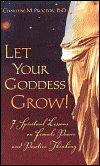
Wicca/witchcraft and New Age/mainstream metaphysics share elements of philosophy, theology, and language. While we sometimes differ, we also borrow a great deal from each other. In her introduction to Let Your Goddess Grow! Charlene Proctor writes:
We are born in the flesh with an opportunity to create reality by how we think. And by embracing the significance of the Mother Goddess, who is a reminder of our body, the earth, and our emotions, we are consciously aware of the responsibility we have to maintain our systems in balance. She gives us a world to manipulate. In doing so, we utilize our vehicle of power, which is our brain. It is an acceptance of our own divinity. With conscious awareness, we can become a channel for our spirit-power. And that is the true state of empowerment (p. 12).
The language here and throughout the book is almost pure New Age. Proctor seems to be seeing the Goddess more as a metaphor or archetype than as the Great Mother whose children we are and whom we worship. Yes, we are Her children and She can manifest in us, though us, and as us, but are we ourselves goddesses? How much of our own reality do we create? Who’s in control? These are questions that can inspire long discussions. Everyone who reads this review will have her own opinion of who the Goddess is and what her relationship is to Her. We all have ideas about the realness of reality (whether it’s consensual or magical reality), and we all like to think we’re in charge.
So let’s not go there right now. There’s a lot that’s good and useful in this book. The lessons Proctor sets forth are lessons we all have to learn in this life—they’re about insight, balance, resiliency, our authentic self, abundance, corporate soul, and the divine feminine. As we engage in these lessons, we examine our lives, our old programming, our left-over hurts, our on-going challenges, our occasional triumphs. We learn to let go of the old status quo and move into a new space of empowerment as women in a world that is still patriarchal. Each lesson gives us both theory and practice: affirmations to use before we get out of bed in the morning and lines to fill in about our own lives and issues, quotations from real women and questions we can put into the circle of our friends for discussion. “Ride daily complexity with more present-moment awareness,” Proctor admonishes us, and “build thankfulness into your spiritual skill set.”
When I asked Proctor in an email to clarify her view of the Goddess, she replied, I believe the first way to lead the mainstream (gently) back to Her is to first recognize Her within ourselves. If we don't carry a thought in our minds first, we can never manifest anything in life that we desire, you know this to be true working with the powers that be. Manifestation first happens with imagination, passion and clarity. Mainstream society lacks this with regards to the Mother… (Nov. 21, 2005). Readers of SageWoman may or may not agree, but perhaps what we can agree on is that it’s good to have an open mind to other people’s varieties of religious experience. While in Lesson 4, for example, the divine is called God, there is also a “spiritual inventory” that invites us to search our souls to find our authentic selves.
In Lesson 6, “Corporate Soul: Use Spirit and Strength to Guide Work Life,” Proctor briefly recapitulates ancient history (sky god and earth mother) and says that we need to unite intellect (“He”) and emotion (“She”) as the “organizational metaphor” for the modern workplace. Lesson 7 is “The Divine Feminine: Bring Mother God [sic.] into Your Work and Life.” To revive the goddess in us and “grow a balanced, empowered self,” we need to confront our fears and self-doubts, investigate sex, property, and power, and “build self-worth through a woman-affirming spirituality.” After explaining “Christ consciousness and the Symbols of the Divine Feminine,” Proctor introduces us to Sophia (and Jesus) and Shakti (and Shiva). “If we incorporate Sophia, Shakti, or other images of the divine mother already present in many wisdom traditions as part of our spiritual heritage,” she writes, “we will have acknowledged our own evolution. … As human beings, we will internalize our potential dimension of the cosmic whole and revisit our purpose, which is to authenticate ourselves by being reborn through the grace of Shakti, as we are reborn by Sophia as a Christ” (p. 250). At its heart, this is a book that can change our world.
~review by Barbara Ardinger, Ph.D.
Author: Charlene M. Proctor, Ph.D.
The Goddess Network Press, 2005
